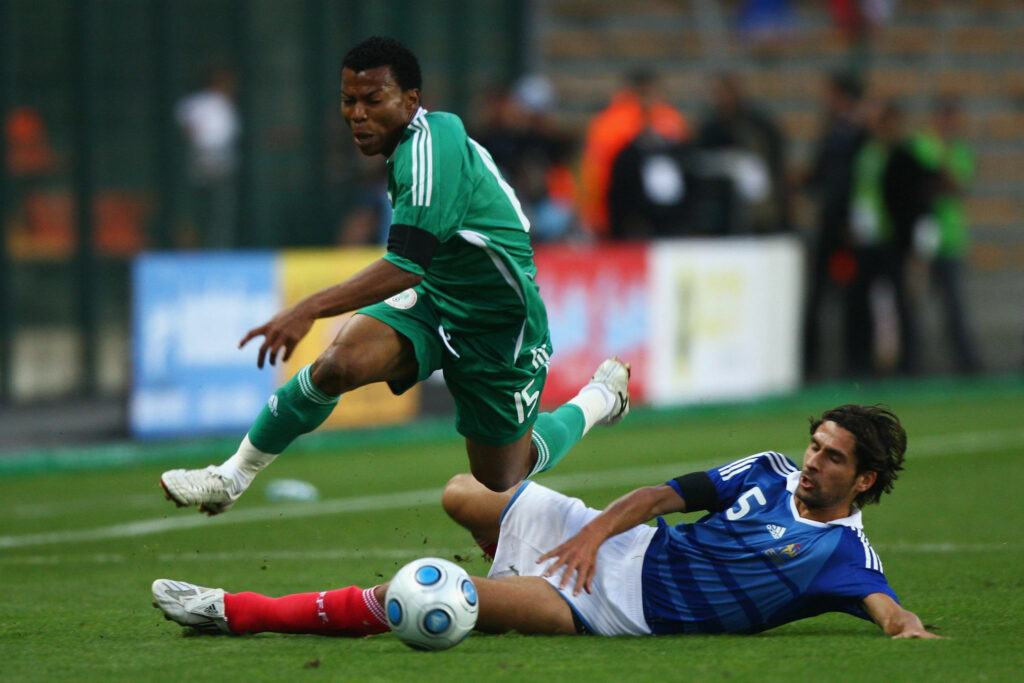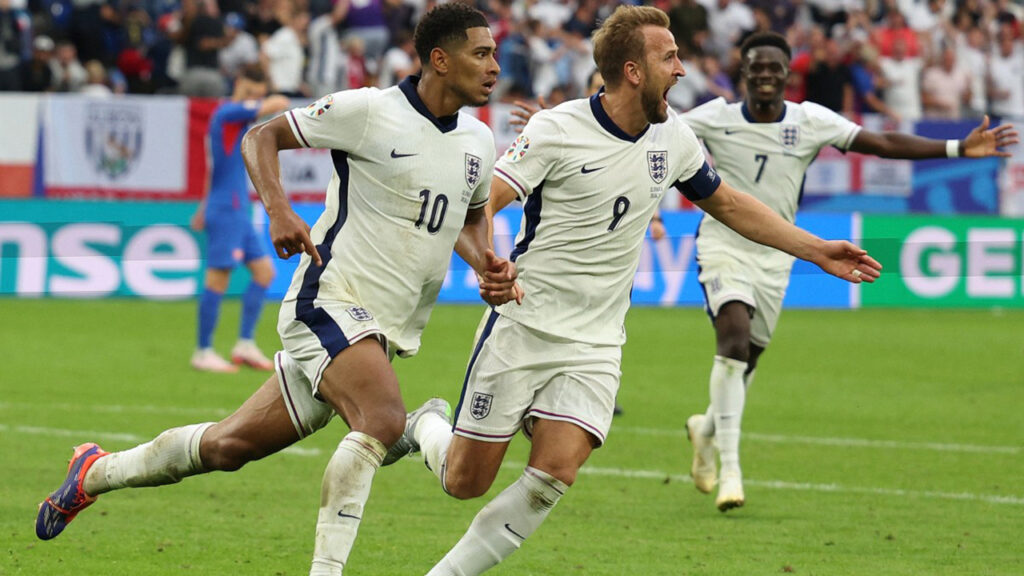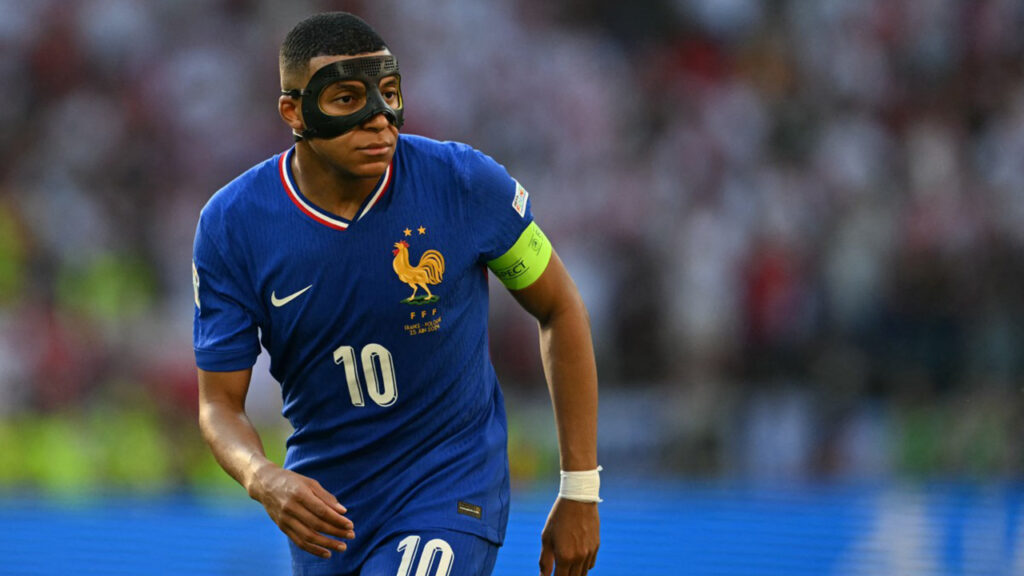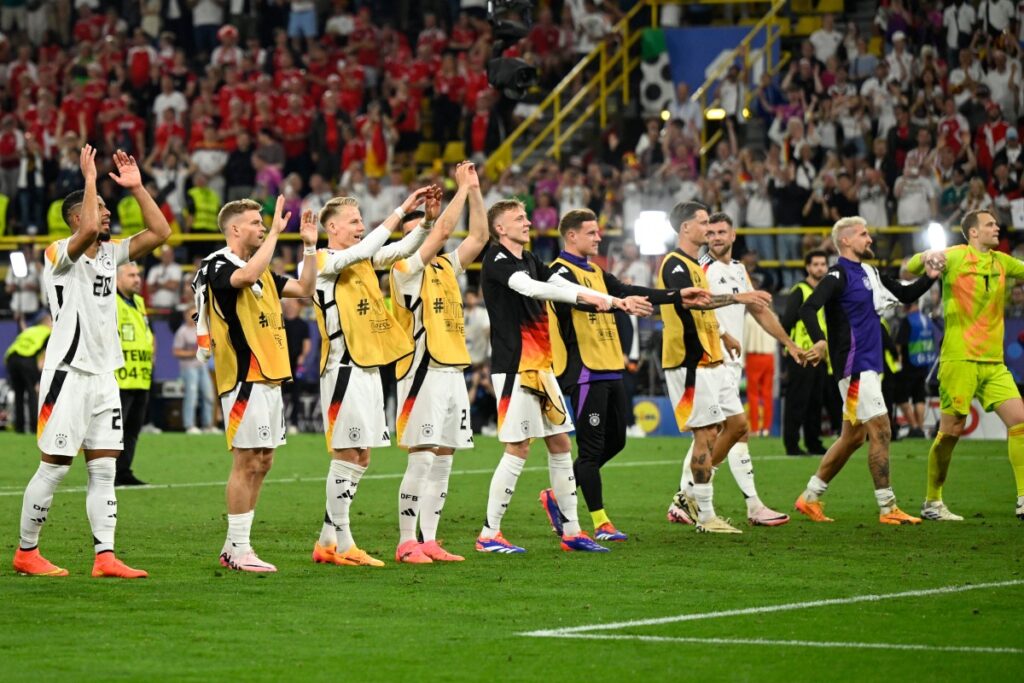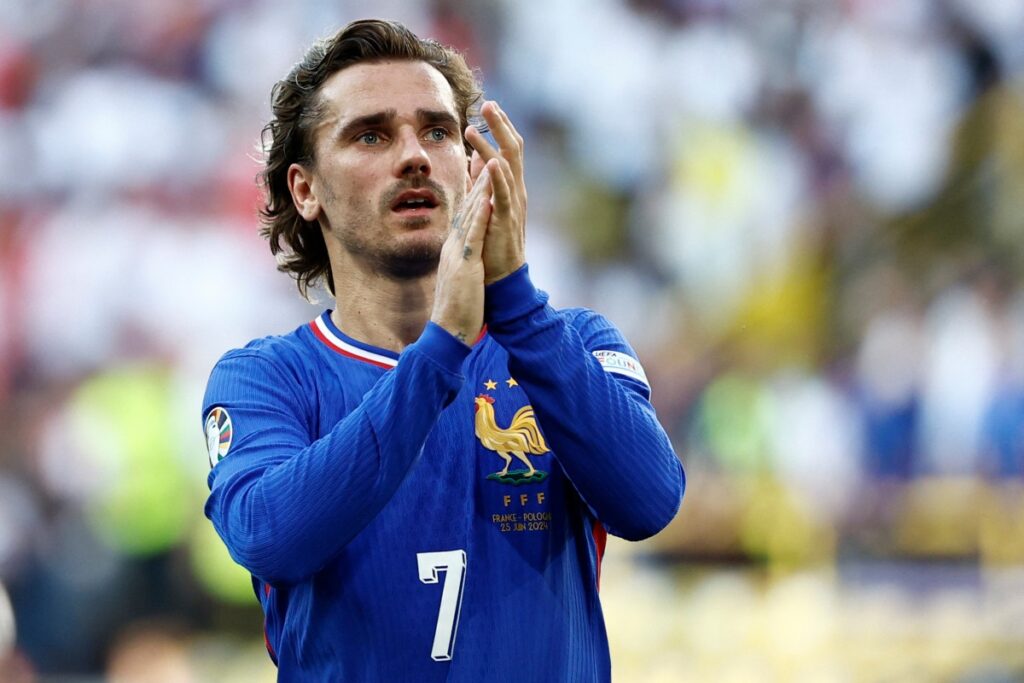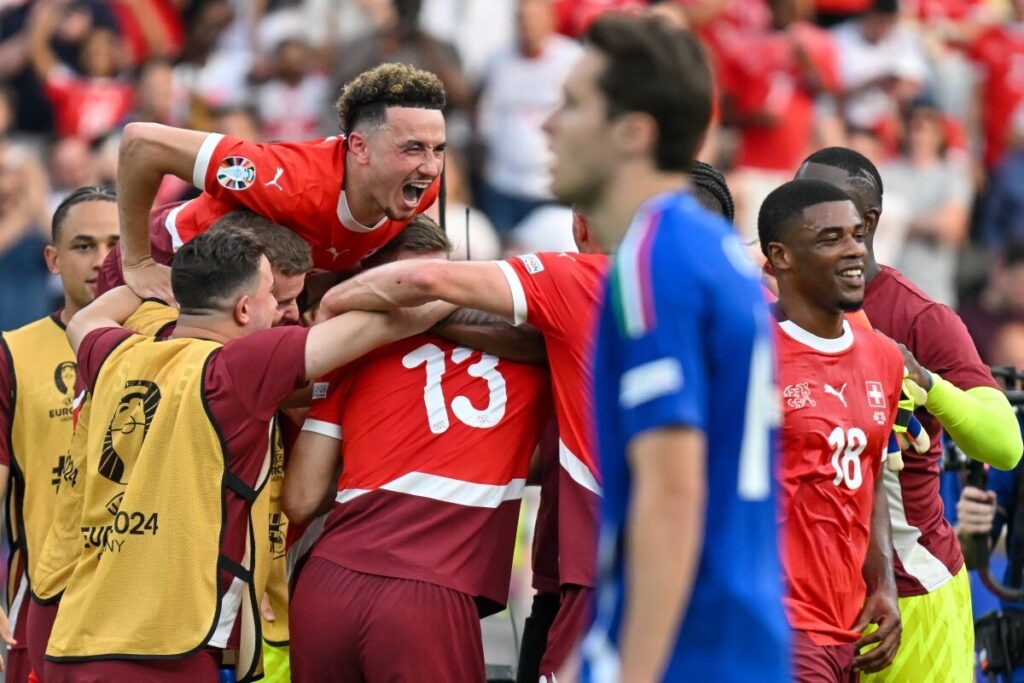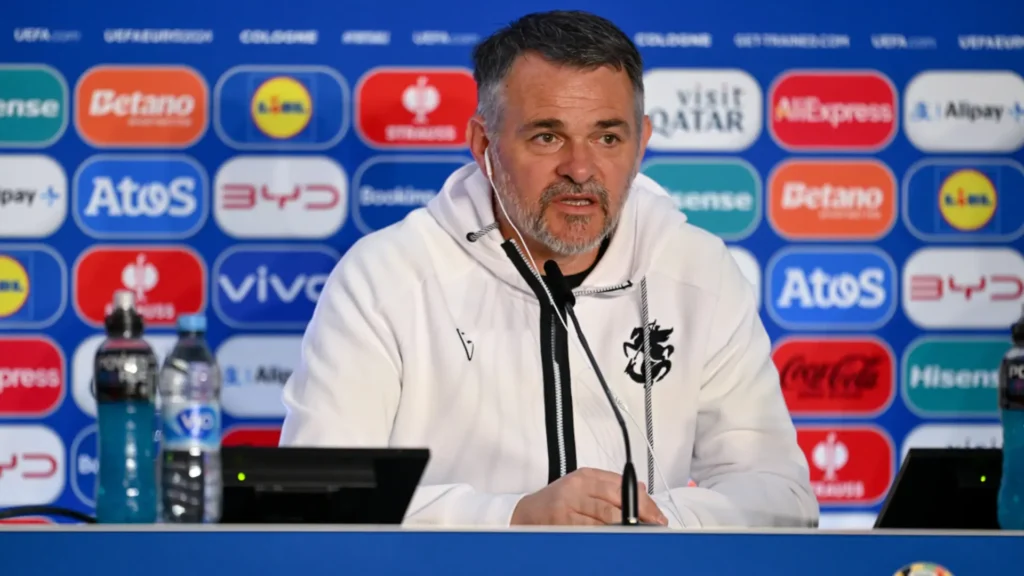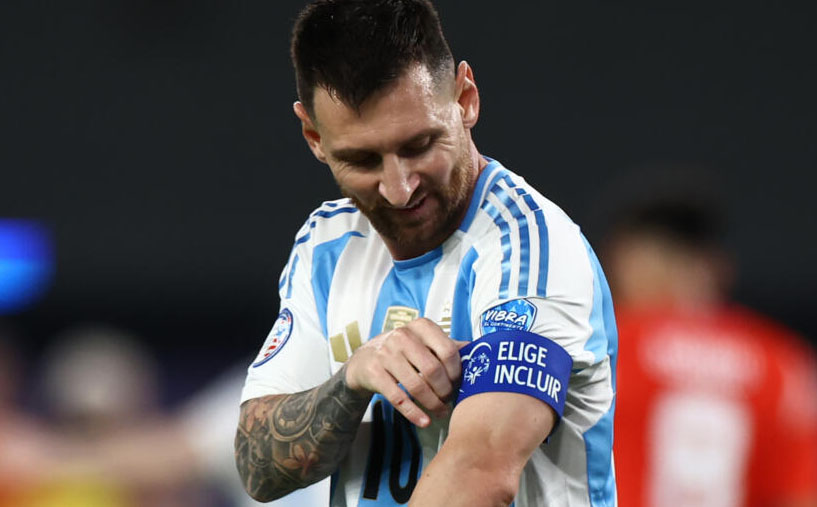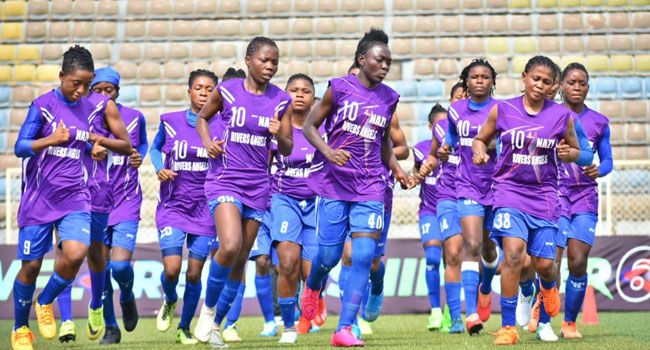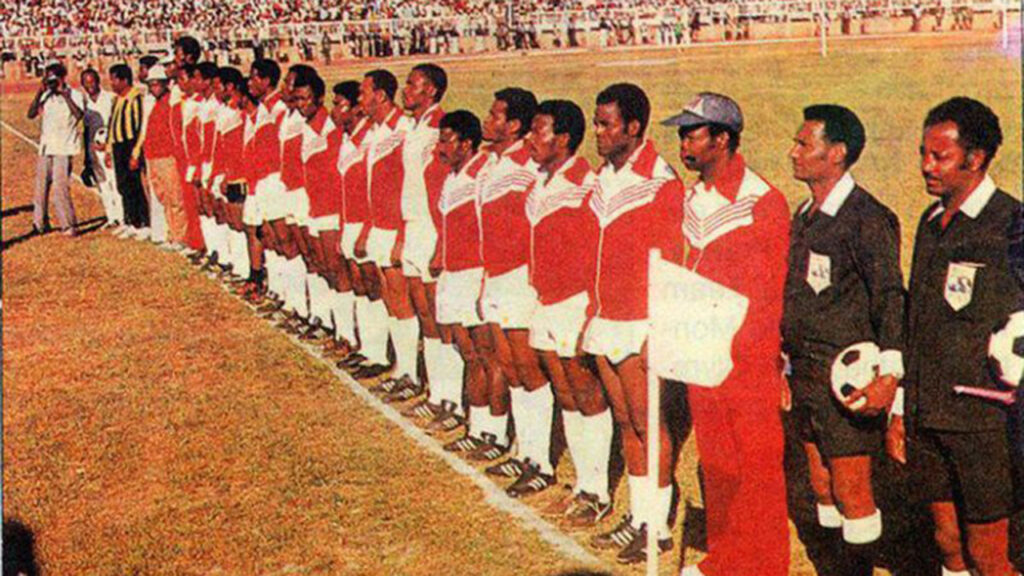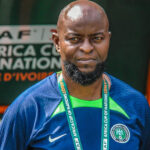
It’s early June, the weather is pristine, the stage is set, as an all important 2010 AFCON/World cup qualifier is about to get underway, with the Super Eagles squaring up against the Harambee Stars of Kenya at the National stadium Abuja (now christened the M.K.O Abiola stadium).
We had barely taken our seats with fans still trooping into the stadium when within a couple of minutes after kick off, what looked like a misplaced pass from Yusuf Ayila in midfield to a teammate was poorly intercepted by a Kenyan player. Suddenly that teammate in question pounces on the loose ball, takes the ball in his stride, waltz past two challenges and faced with the keeper buries his effort in a thrice sending fans into raptures within three minutes in for 1-0. Suddenly, questions of “Who scored, who scored” echoed around stands, only for the stadium announcer to call out the name “Ikechukwu Uuchhheee”. It took a couple of goals later from Victor Obinna for match day nerves to settle at full time but it was Ikechukwu Uche who got the ball rolling as usual in a stadium that he would eventually make his own turf during his international odyssey.
Such was the impact of the then Getafe hitman that with him in the starting XI, the Super Eagles chances of winning games grew higher, even if the team were playing badly, due to the Aba-born hitman’s prolificacy in front of goal and industry. For a player who only made his international debut approaching his mid-20s and never really playing international football at the youth level, his rise to prominence as Nigeria’s no.1 striker at the tail end of the 2000s was quite praiseworthy.

Back in 2007, the Super Eagles were not so convincing in front of goal, evident with their struggles at a friendly in Griffin Park, London – the former home of Premier League side Brentford – when the Black Stars of Ghana humiliated Austin Eguavoen’s side 4-1 despite boasting of the lethal pair of Yakubu Ayegbeni and Julius Aghahowa in their ranks. It was rather upstarts Junior Agogo, Asmaoah Gyan and former Enyimba great Joetex Frimpong who were triumphant on that dark cold night with Taye Taiwo’s consolatory goal doing little to shield an utterly wingless display. The sight of Aghahowa struggling to find his once electrifying self in national colours while enduring a poor run of two goals in 11 games in over three years was a huge worry to Nigerians.
The Super Eagles were not faring any better in qualifying matches for AFCON 2008 either with the exception of a 3-1 win against Niger in Niamey, never mind boasting one of the best front lines on the continent.
Somewhere in Huelva, Spain, a petite and light skinned striker was banging in goals for modest side Recreativo Huelva and within four years had helped his side rise from the Segunda division as the division’s top scorer with 20 goals in just 28 matches to the summit of La Liga, contributing a further eight goals in 23 appearances in his maiden season at the top flight.

His season’s highlight; that famous goal at the Bernabeu in December 2006 which turned World Cup and Balon d’Or winner Fabio Cannavaro to Francisco Pavon overnight in a shock 3-0 win on his side’s way to finishing eighth on the log that season. With a grand total of 50 goals in 133 appearances for the Andalusian side, Uche was on the transfer radar of top La Liga sides and he would eventually join Madrid-based Getafe with a grand unveiling to booth in the summer of 2007.
It was only fitting that he would get his maiden call up that summer as the Super Eagles played North Macedonia in a goalless draw in Skopje with the Garri Master coming on as a second half substitute for his international bow. He would go on to get a second call up under new Super Eagles coach, German great Berti Vogts against Lesotho at the Warri Township Stadium where he would finally announce himself to Nigerians and International football with his debut goal in a 2-0 win.
It was the start of something beautiful in the Super Eagles shirt but it wasn’t one without its early bumps. In just his third game for the National team, he was brought on in a friendly against Mexico with the scores at 2-2 as the Eagles surprisingly threw away a healthy 2-0 lead in Juarez and Uche got fouled in the box as the game ebbed into its final minutes, and surprisingly decided to take the penalty himself ahead of more senior players like John Utaka, Obafemi Martins who was on for a hat-trick at the time. Uche blew his effort over the bar with virtually the last kick of the game which denied Nigeria a deserved win and left Nigerian fans who stayed up late into the night barring time difference disappointed though it was only a ‘friendly’.

If his immersion into International football still left anyone in doubt, we were in for a special few years of true belief. He would start 2008 with a goal in a friendly against Sudan in preparation for AFCON 2008 in Ghana, but surprisingly the Getafe hitman didn’t register a goal or an assist in the tournament as the Super Eagles laboured through the group stages and were unceremoniously bundled out in the quarter final against 10-men host and arch rivals Ghana in an AFCON classic in Sekondi.
Such setback didn’t deter Uche who kept playing a key role in Getafe’s surprise start to the season alongside Real Madrid loanee Roberto Soldado and when the AFCON/World Cup qualifiers got underway in June, Nwa Aba opened the scoring against 2010 World Cup hosts South Africa in Abuja, a stadium he will score more home goals than any other Super Eagles player till date with a thumping header off a teasing cross from Utaka past Bafana Bafana’s Fernandez in a 2-0 win.

June 21, 2008 would prove how lethal and efficient Uche was as a striker in the Green jersey. The opponents were lowly Equatorial Guinea who gave the Super Eagles a good game in Abuja but were let down by poor finishing. Nigeria had taken the lead through Ayegbeni but needed to seal the win with a second goal to calm the restless fans at the MKO. Enter substitute Uche who surprisingly was benched by Shuaibu Amodu and with the Equatoguineans pressing for an equalizer and leaving spaces behind, the evergreen Nwankwo Kanu sent a raking ball from the home side’s half which Uche duly controlled just near the technical area at the other half. Faced with two retreating defenders, two quick steps and a swivel turned his marker inside out and unleashed a thunderbolt with his right foot to the top left side of the Equatoguinean goalie who stood no chance to seal a vital 2-0 win.
A high profile friendly against former World Champions France in Saint-Etienne will live long in the minds of the most fervent of Uche fans as the Nigerian striker posted a man of the match performance that prompted French Newspaper L’equipe to rate the petite striker 8/10 in a sterling display of fancy footwork, incisive runs and all round attacking play. Uche’s display even coerced Arsenal’s legendary manager Arsene Wenger to quip “Uche is unbelievable” while on punditry duty that night. In a game boasting of accomplished strikers like Nicolas Anelka, a young Karim Benzema, etc it was rather the Garri master who stood out on the night. He was very unlucky not to score to cap his brilliant display but ironically it was his fine effort just outside the box which ricocheted off the post to the path of Joseph Akpala who finished easily past Steve Mandanda that gifted Nigeria a shock win at Stade Geoffrey Guichard. The game would even spark a FIFA ranking debate afterwards.

But just when his career was reaching a very high point after a summer move to Real Zaragoza, tragedy set in when in early September 2009, Uche ruptured his anterior ligament in a league game against Sevilla at the Ramon Sanchez-Pizjuan which kept him out for six months, effectively ending his season and any hope of going to the AFCON in January and possibly the World Cup that summer. While Zaragoza coped fairly in his absence, the Super Eagles flattered to deceive in Angola, finishing third to the disappointment of their ever expectant fans at home which cost Amodu his job in the end.
The loss of Uche and midfield star Mikel Obi saw a disjointed performance in South Africa as Nigeria crashed out for the second time in World Cup history at the group stages. Uche would suffer a relapse in his recovery when his knee gave up in a practice game that summer with Los Blanquillos and with the Eagles inactive until 2011, he made his long awaited return to international duty after almost two years away having recovered from a meniscus damage against Ethiopia with former Super Eagles great Samson Siasia now in charge.
Uche picked up from where he left off with two goals in a 4-0 win in Abuja and he would go on an impressive run of six goals in four straight matches for Nigeria; three goals against Ethiopia – in two separate games – a goal against Kenya and a brace against Argentina. A solid eight goals in seven international games that calendar year is to this day the joint-highest goal return in an international calendar year by any Nigerian player this century.

The Super Eagles would fail to qualify for AFCON 2012 and Siasia was axed in the aftermath, opening the door for the iconic Stephen Keshi to take over the helm and Uche would prove key in The Big Boss’s quest to get his beloved country to a now revamped AFCON tournament in 2013, scoring three times in over seven matches in qualifying.
Rumour sufficed of a clash of egos between the pair just before the continental showpiece but all was put to bed as the Super Eagles became African champions in February 2013 in South Africa. Uche would make four appearances from six games Nigeria played, most notably starting in the final but yet again failing to score in a major tournament for the Super Eagles. Uche would eventually be overlooked for the Confederation Cup that year in Brazil and the remaining qualifiers for the 2014 World Cup despite being in decent form for Villarreal in La Liga. Keshi remained unmoved by such performances even when quizzed by the Nigerian media about Uche’s constant omission.
The omission of Uche and fellow AFCON winners Brown Ideye, AFCON winning goal hero Sunday Mba, and Uzoenyi Ejike from the list to Brazil after qualification was secured seemed to mark the end for Uche’s international career. Following a fair display in Brazil, the Super Eagles were struggling to qualify for the 2015 AFCON after a shock loss to Congo Brazzaville at home and limp draw to South Africa away. A surge in form prompted an outcry for Uche’s re-introduction and like the prodigal son ‘Ik’ marked his return on the 6th of September, 2014 with a cool finish from the spot in Pointe-Noire against Congo Brazzaville in a 2-0 win for his 19th international goal in 45 appearances. This would prove to be his last goal for Nigeria and he would get his 46th and final cap in the following fixture, coming on as a substitute against South Africa in a frustrating 2-2 draw in Port Harcourt that confirmed Nigeria’s non-qualification for the 2015 AFCON.

For an international career that spanned seven years (not forgetting a two-year absence from the national team with two horrific injuries) it wouldn’t have been surprising to see Uche hit the 25 goal mark or even surpass that mark internationally but whether he could have reached the 37 goal record set by the Iconic Rashidi Yekini is a discussion for another day.
The ever smiling striker though has no regrets playing for his beloved country. Speaking to The Nation Newspaper Uche described his time in the National Team with much fondness. “Playing for the Super Eagles was my dream and I was so happy for being part of the team that won the African Cup of Nations in 2013,” he explained. “Going as far as winning the AFCON trophy was a feeling you can’t describe and I would say I enjoyed my time playing for the Super Eagles.
“I had a great time and I’m happy I was able to make my fans and family happy with my performances while playing for the national team”.
Although now retired following the expiration of his contract with Spanish lower division side Gimnastic Tarragona in 2019, Uche can reflect on a distinguished career as Africa’s second highest goal scorer in La Liga history only behind the iconic Samuel Eto’o and an elite list of Top 5 goal scorers for the Super Eagles. There is no disputing that Uche’s career at the top was nothing short of inspirational, forged in the midst of adversity and refined as gold.

